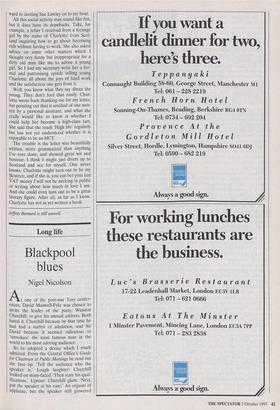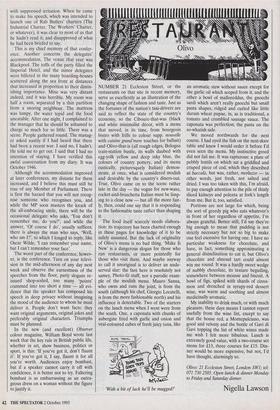Long life
Blackpool blues
Nigel Nicolson
At one of the post-war Tory confer- ences, David Maxwell-Fyfe was chosen to invite the leader of the party, Winston Churchill, to give his annual address. Both hated it, Churchill because by that time he had had a surfeit of adulation, and Sir David because it seemed ridiculous to 'Introduce' the most famous man in the world to his most adoring audience. So he adopted a device which I much admired. From the Central Office's Guide for Chairmen at Public Meetings he read out the first tip: 'Tell the audience who the speaker is.' Lough laughter: Churchill looked on stony-faced. 'Then state his qual- ifications.' Uproar: Churchill glum. 'Next, Put the speaker at his ease. An orgasm of applause, but the speaker still glowered
with suppressed irritation. When he came to make his speech, which was intended to launch one of Rab Butlers' charters (The Industrial Charter, The Workers' Charter, or whatever), it was clear to most of us that he hadn't read it, and disapproved of what he had been briefed to say.
This is my chief memory of that confer- ence. Another concerns the delegates' accommodation. The venue that year was Blackpool. The toffs of the party filled the Imperial Hotel, and the minor delegates were billeted in the many boarding-houses scattered along the sea front at distances that increased in proportion to their dimin- ishing importance. Mine was very distant indeed, and it was horrible. My room was half a room, separated by a thin partition from a snoring neighbour. The mattress was lumpy, the water tepid and the food uneatable. After one night, I complained to the manager that he should be ashamed to charge so much for so little. There was a scene. People gathered round. The manag- er asked nastily if I had heard that there had been a recent war. I said no, I hadn't. He told me to get out. I said that I had no intention of staying. 1 have verified this awful conversation from my diary. It was October 1946.
Although the accommodation improved at later conferences, my distaste for them increased, and I believe this must still be true of any Member of Parliament. There is first the hazard that you will not recog- nise someone who recognises you, and while the MP soon masters the knack of the all-embracing smile, there will be the occasional delegate who asks, 'You don't remember me, do you?', and while the answer, 'Of course I do', usually suffices, there is always the man who says, `Well, who am I?', to which I longed to reply, like Oscar Wilde, `I can remember your name, but I can't remember your face'.
The worst part of the conference, howev- er, is the conference. Turn on your televi- sion in the mid-afternoon of any day next week and observe the earnestness of the speeches from the floor, party slogans re- issued shop-soiled, too many `points' crammed into too short a time — all evi- dence that the speaker has composed his speech in deep privacy without imagining the mood of the audience to whom he must deliver it. People don't want facts: they want original arguments, original jokes and preferably original characters. Triumphs must be planned.
In the new (and excellent) Observer colour magazine, William Boyd wrote last week that the key rule in British public life, whether in art, show business, politics or sport, is this: `If you've got it, don't flaunt it'. If you've got it, I say, flaunt it for all you're worth. Audiences enjoy bombast, but if a speaker cannot carry it off with confidence, it is better not to try. Faltering bombast is as embarrassing as an outra- geous dress on a woman without the figure to justify it.



















































 Previous page
Previous page